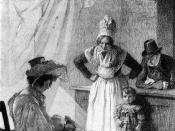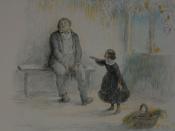The Myth of Romantic Love and Gustav Flaubert's "Madame Bovary"
Gustav Flaubert's novel "Madame Bovary" is a study of human weakness and the "myth of romantic love"; the despair and unhappiness faced by those who are unwilling or unable to resolve the conflicts between their dreams and idealized aspirations and the real world; in modern terms or as M Scott Peck might say it is a study of a neurosis. Furthermore, the author examines middle-class or bourgeois conventions and the myth of romantic love, exposing weaknesses and dealing with the inability of the different characters to communicate with each other, face and accept the truth. Flaubert manages to relate everything in the novel to love: lust, beauty, power, money, fantasy. The love is the moving power; however, nobody knows exactly what love is. Our protagonist Emma Bovary spends the whole novel going back and forth about whether she's in love, out of love, thinking about love, dreaming about love, worrying about love.
M Scott Peck gives an example definition of love saying: "The will to extend one's self for the purpose of nurturing one's own or another's spiritual growth." (81)
Most young girls are blinded by fantasies of love and adventure, but Emma is more concerned with them than most. Being raised in a convent and having many opportunities to read, her head is full of dreams of undying love and adventure. Her tendency toward her dream world was also started in the convent where she constantly searched for the mystic and the unusual rather than the real world. She spent all of her time dreaming of the extreme romantic view of knights in shining armor and being queen of an old castle. She shut out the dull routine of everyday life because it hurt her to...


